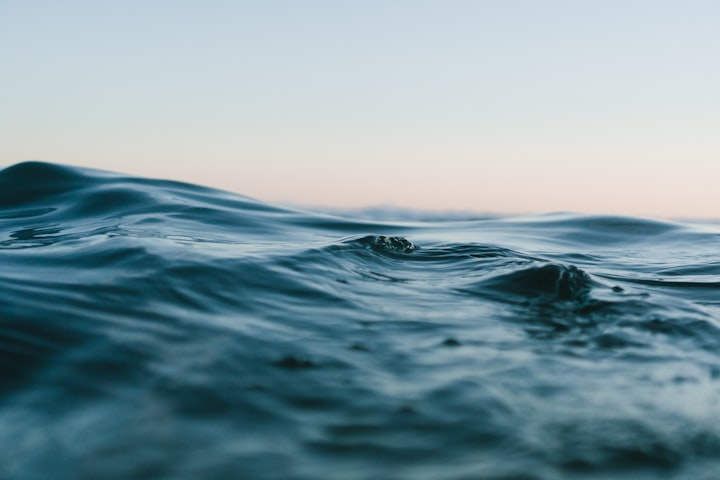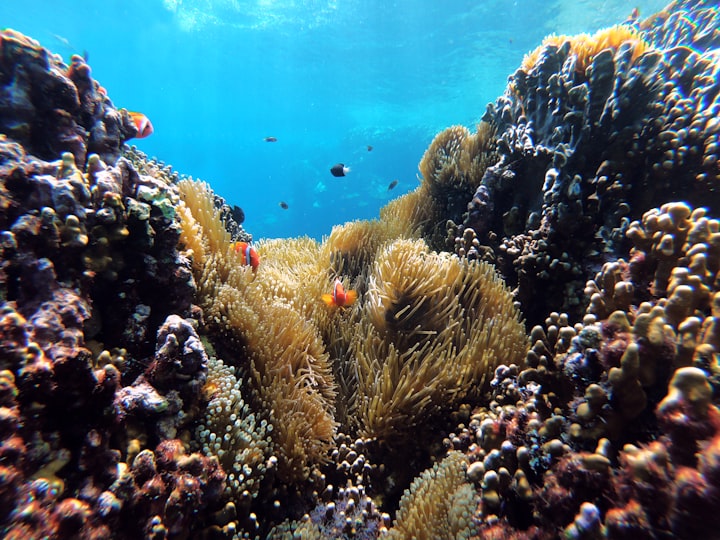5 reasons why we should look after the oceans.
Treat the world how we wish to be treated

1) It facilitates Homo Sapiens place at the top of the food chain
Every single species on this planet adds to the richness of Earth’s biodiversity. It’s that diversity of life, that allows for new species to emerge, species with advantageous benefits that humans can exploit. Those species, and the interactions between those species, directly impact our economy and affect how we live and function via 'Ecosystem services'. So, the ocean that holds 80% of all life on earth and is the biodiversity hotspot of this planet holds untold economic benefits for humans. Elevating ourselves off the backs of other species is what got us to where we are now, the top of the food chain, or 'winner' of the rat race of life.
2) Because being able to breathe is nice...
Ask anyone and they would probably say we're entitled to breathe right? We breathe because the composition of the atmosphere millions of years ago was just the right combination of oxygen, nitrogen and carbon that randomly facilitated the random mutations of our DNA which resulted in evolving lungs.
We evolved to breathe this air ----> (78% Nitrogen, 21% Oxygen, 1% Carbon, Argon & Other). We did not evolve to breath anything else.
If we change the composition of this air (adding excess Carbon Dioxide via pollution & climate change), then we’re not entitled to be able to breathe whatever composition of the air that comes next, not unless we evolve too – or develop the technology that allows us too. By harming the ocean, and subsequently the biological foundations within the ocean that store carbon (organisms storing carbon in cells, not allowing it to float up to the atmosphere) we are messing with the balance of different elements within the atmosphere. If we continue down this road, it won’t end well for us - or anything that breathes air.

3) Only 5% of the oceans has been explored
This reason is a tad ‘philosophical’. So we know today that we have discovered and classified over 400,000 marine species to date right, and we also know that we have only explored around 5% of the ocean. It's also estimated that 91 per cent of marine species has yet to be discovered and classified. That puts the total number of species within the ocean between 2-10 million!! Imagine what could become available to us if we catalogued that number of marine species! The diversity of adaptations, traits and biology, the countless benefits that could elevate mankind. Think of how far we have come, and the benefits we reap from just the species we’ve discovered... it's hard to grasp how far the diversity of species from the ocean could take mankind. Yet allowing the ocean to fall ‘ill’ puts not just the species we know about, but all species at risk. A risk that could one day prove to be our biggest mistake.
Imagine if the cure for cancer was swimming around 2 miles deep in the western Pacific , but because we couldn’t get there due to limitations in technology we didn’t know about it. Imagine because of us ‘killing’ the ocean, that species of fish, the one that could cure cancer, was made extinct. We wouldn’t even know that that fish could cure cancer as we hadn’t discovered it. We have no idea what’s in the parts of the ocean we can’t get too. Hell, mermaids could actually be real. Who knows right? Allowing the ocean to suffer, and ultimately die is almost like playing Russian roulette with our future – but not just mankind’s, but with that of the whole planets.
The bullet Is climate change, the gun is humanity, and the pulling of the trigger is our ignorance to what our species is doing.

4) Planet Earth < Planet Ocean
Earth is 70% ocean, 30% landmass. 10% of that landmass is habitable to us. Our planet is an ocean planet. The very requirement that scientists use to catalogue and identify ocean planets within the universe is ‘a terrestrial planet that contains a substantial amount of water’. Earth meets those requirements, 70% is a substantial amount. Earth should be described as an ocean planet. We occupy 3% of this planet. This ocean is what truly defines us, defines most of the life on this planet. This ocean has allowed us to move around the planet, move resources, save species, end species, spread across the world and become the ‘top dog’.
5) The ocean is the source of our origins
The water is our true home. Our genetic roots come from the ocean. Humans today came to be in existence by life arising in the ocean from non-living matter such as carbon and water. This evolutionary process involving molecular self-replication, self-assembly, autocatalysis, and the emergence of cell membranes has led to us being brought into creation, for humans to be 'born'! Why would we want to harm that with which we once came? What humanity is doing to the oceans is wrong. Harming, and ultimately 'killing' the ocean it's like killing your mum, would you do that? No.

About the Creator
Bradley Knight
Grown on the British Isles, exploring beyond.
Marine Ecologist by trade, Scientific Illustrator and Communicator by hobby.






Comments
There are no comments for this story
Be the first to respond and start the conversation.